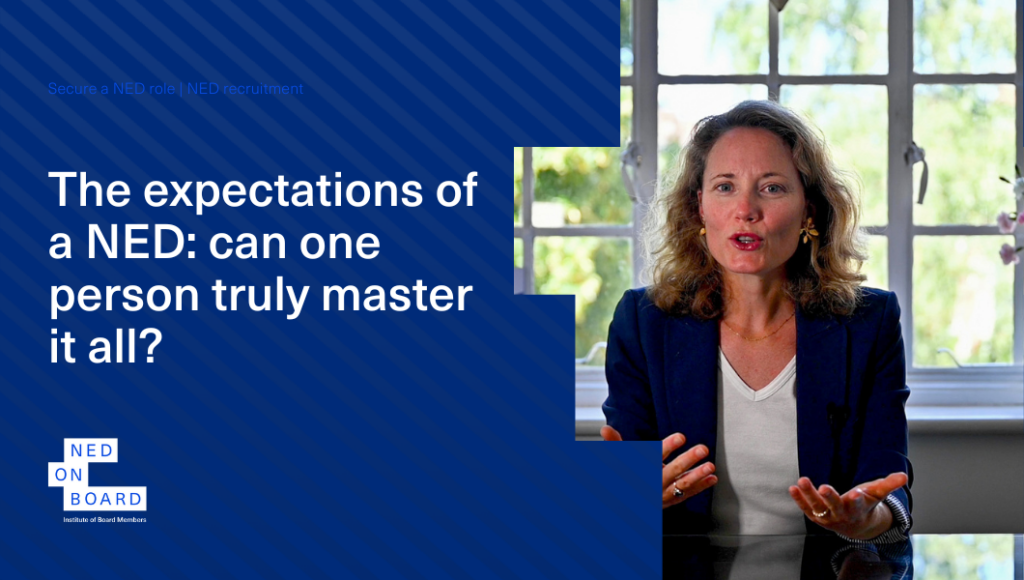Could expectations in non-executive role specification be at times unrealistic?
The role of non-executive directors has become increasingly pivotal. NEDs are tasked with offering independent oversight, strategic guidance, and governance expertise, all while ensuring the company’s accountability to shareholders and other stakeholders. Spurred by factors such as digital transformation, the climate crisis, geopolitical instability, or heightened pressure from stakeholders, the expectations and responsibilities of NEDs have expanded. So have the job specifications associated with these roles! This expansion raises a critical question:
Is the depth and breadth of expertise required of a non-executive director realistic, and indeed, can it be embodied in a single individual?
The ideal vs. the real
Job specifications for non-executive directors often read like a wishlist. These documents typically call for a blend of generalist skills, such as industry knowledge, financial acumen, strategic insight, risk management proficiency, regulatory understanding, and interpersonal skills. Additionally, NEDs are expected to navigate the complexities of corporate governance, possess the foresight to anticipate future challenges and opportunities or bring specialist knowledge and skills, such as technology, cyber, equality, diversity and inclusion or sustainability.
Such comprehensive demands can seem overwhelming, if not outright unrealistic. In practice, it is rare to find a single individual who possesses an expertise in all these areas. More often, NEDs bring a combination of strengths, complemented by the collective experience of the board.
The evolution of NED responsibilities
The role of NEDs has evolved significantly over the past few decades. Historically, NEDs were primarily seen as advisors who brought a fresh perspective to board discussions. However, the aftermath of financial crises, corporate scandals, and increasing regulatory scrutiny has transformed this role into one that demands active engagement and accountability.
Today, NEDs are not only expected to provide strategic oversight but also to act as guardians of corporate integrity. They must challenge executive decisions, ensure robust risk management practices, and maintain a vigilant eye on compliance and ethical standards. This evolution underscores the increasing complexity of the role and the growing expectations placed upon NEDs.
The case for diverse or specialised boards
Given the expansive expertise required, one solution lies in embracing a more specialised approach to board composition. Rather than seeking out individuals who meet an exhaustive list of criteria, boards should focus on assembling a diverse group of directors, each bringing distinct strengths to the table. This collective expertise can provide the comprehensive oversight needed without overburdening individual directors.
In addition to this, sub-committees of the board or advisory boards can be established with well-defined scopes to address specialist matters. For instance, a technology committee could focus on digital transformation and emerging technologies, while a people committee might concentrate on talent management and organisational culture. These sub-committees or advisory boards, tailored to the specific industries, challenges, and opportunities of the organisation, can provide in-depth expertise and insights that are crucial for informed decision-making.
Diverse boards, supplemented by specialised sub-committees, can enhance the board’s overall effectiveness and resilience. Such an approach ensures that complex issues receive the attention they require from individuals with the appropriate expertise.
Realigning expectations
To make the role of NEDs more realistic and attainable, it is crucial to realign expectations. This involves recognising that no single individual can be an expert in every domain and instead valuing the unique contributions each director brings. It also means providing ongoing training and development opportunities to help NEDs stay abreast of evolving industry trends and regulatory changes.
Conclusion
The depth and breadth of expertise currently demanded of non-executive directors in job specifications often appear unrealistic when considered in isolation. The expectation that one individual can master such a wide range of skills and knowledge may overlook the value of diverse and specialised boards. By focusing on collective expertise and fostering a culture of continuous learning and collaboration, companies can create a more sustainable and effective boardroom dynamic. Ultimately, the goal should be to ensure that the expectations placed on NEDs are both attainable and conducive to robust corporate oversight.
To find out more about training and professional development opportunities to increase your appointability and broaden your value proposition, click on the link below.
Related resources
What are the skills demanded by companies for their non-executive directors?
Winning the competition: non-executive director skills in high demand



